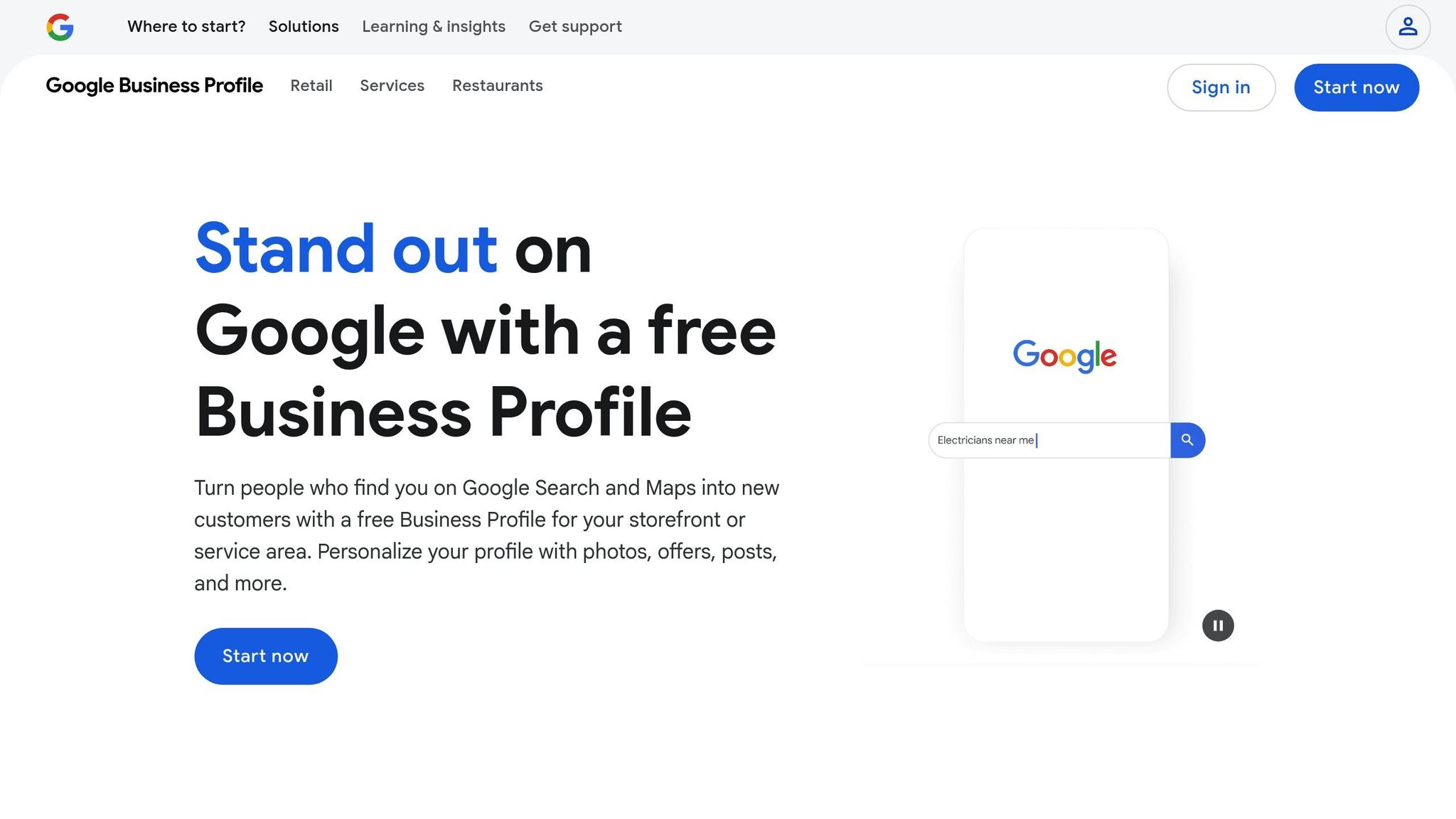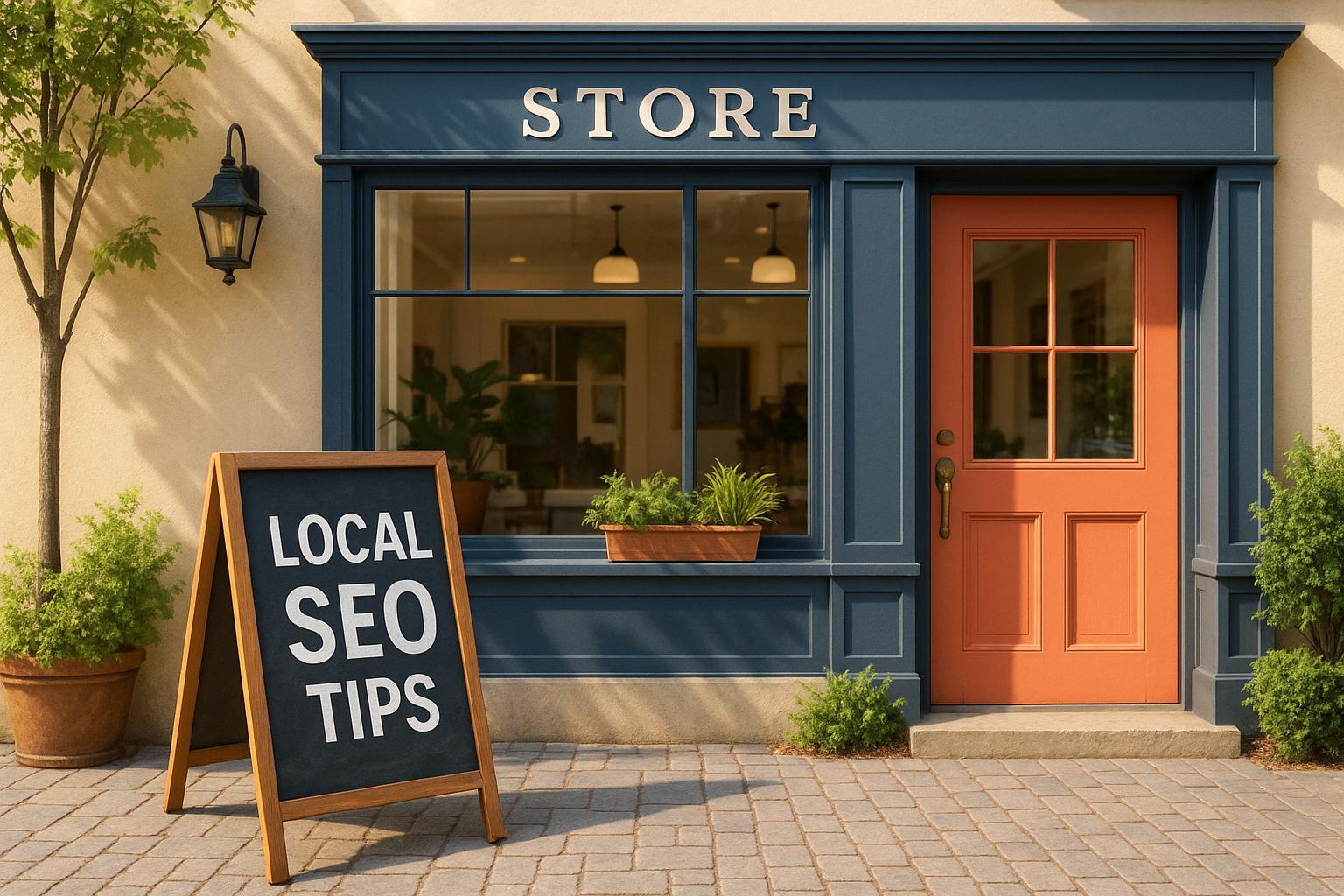Local SEO is your ticket to connecting with Charleston customers – both locals and tourists – right when they’re searching for what you offer. With 46% of Google searches focused on local information and 76% of users visiting a business within 24 hours of a local search, optimizing your online presence is crucial for driving foot traffic and sales.
Here’s what you need to know:
- Google Business Profile: Claim and verify your profile to enhance visibility. Include local keywords like "Downtown Charleston" and update details regularly.
- Customer Reviews: Respond promptly to reviews (positive or negative) to build trust. Encourage happy customers to share their experiences.
- Local Keywords: Use tools like Google Keyword Planner to find Charleston-specific phrases and incorporate them naturally into your website content.
- Content Creation: Write about Charleston events, landmarks, and seasonal topics to connect with your audience.
- Backlinks and Citations: Partner with local businesses, sponsor events, and ensure your business info is consistent across directories.
- Schema Markup: Add structured data to your website to improve search engine understanding and visibility.
Local SEO isn’t just about rankings – it’s about becoming part of Charleston’s story. Whether you’re targeting locals in West Ashley or tourists on King Street, these strategies will help you stand out in a competitive market.
Local SEO For Beginners (2025 Complete Guide)
Setting Up Your Google Business Profile for Charleston Visibility

Think of your Google Business Profile as your virtual storefront in Charleston. When it’s complete and verified, it boosts both your local visibility and customer trust. With 90% of consumers checking online reviews before visiting a business and 84% trusting those reviews as much as personal recommendations, having a well-optimized profile could be the deciding factor in attracting customers.
Claiming and Verifying Your Profile
Claiming and verifying your Google Business Profile is the first step to unlocking all the local search features. Verified profiles show up more prominently in local results, while unverified ones miss out on key features like responding to reviews or posting updates.
"Google Business Verification is fundamental in securing your place in local search results and building trust with your audience." – Results Driven Marketing®
Getting started is simple. Search for your business on Google and click "Own this business", then "Manage now." On Google Maps, click "Claim this business" and follow the same steps. If someone else has already verified your profile, you can request ownership. The current owner has three days to respond, and if they don’t, you can proceed with the claim.
Google will assign your verification method, which might be a postcard, phone call, email, or instant verification. The postcard option is common and usually arrives within 5–7 business days with a code you’ll use to verify your profile. To avoid delays, make sure your business address matches Google’s records exactly.
Once verified, take the time to fill out your profile with detailed local information to stand out in Charleston’s competitive scene.
Adding Local Details to Your Profile
A fully completed profile with locally relevant details can improve your rankings in search results.
Write a compelling business description that incorporates local keywords like "Downtown Charleston" or "Charleston Historic District." Highlight unique features, such as waterfront views or historic charm, that tie your business to the area.
Fill out every field available, including regular business hours, special hours for events like Charleston’s Spoleto Festival, attributes, and service offerings. In a city like Charleston, where tourism plays a big role, it’s crucial to keep your profile updated for seasonal changes. For example, adjust your hours during peak tourist seasons or note holiday closures.
If your business caters to tourists, emphasize special attributes like "Historic Building", "Waterfront Views", or "Walking Tours." For businesses serving locals, focus on offerings that meet community-specific needs, such as locally sourced products or regionally tailored services.
Don’t forget about photos – they’re a powerful way to showcase your business. Include images that highlight local features and update them to reflect the seasons. Accessibility details, like ramp access and parking, can also make a big difference for visitors.
Once your profile is set up, managing customer reviews effectively will help you build even more trust.
Managing Customer Reviews and Interactions
In Charleston’s tight-knit, community-focused environment, reviews act as digital word-of-mouth. About 53% of customers expect businesses to respond to reviews within a week, and one in three expects an even faster reply.
"Responding to Google reviews is a business owner’s secret weapon for building trust with potential customers." – Elizabeth Rule, Platinum Product Expert
Aim to respond to reviews within 24–72 hours. Use the customer’s name and reference specific details from their review to make your replies feel personal. Always thank them for their feedback, and if addressing a concern, offer a sincere apology and take responsibility where needed.
For negative reviews, consider mentioning local challenges – like downtown parking issues – to show you understand and are addressing concerns specific to Charleston.
Encourage positive reviews by reaching out to happy customers, whether through email or in person, at moments when they’re most likely to leave feedback. Pay attention to review trends to identify areas for improvement and refine your customer experience.
When responding to reviews, emphasize Charleston’s core values – community connection and Southern hospitality. These qualities resonate deeply with both locals and visitors, helping you build stronger relationships.
Using Local Keywords and Content to Rank in Charleston
Local searches often lead to quick visits, making keyword targeting a must for businesses. Focusing on Charleston-specific keywords helps your business stand out and connects you with people actively searching for nearby services.
Conducting Local Keyword Research
To strengthen your presence in Charleston, targeted keyword research is key. The first step in successful Charleston SEO is understanding what your local audience is searching for.
Use tools like Google Keyword Planner to find high-traffic, Charleston-specific search terms. Look for phrases that pair your services with local identifiers, such as "Charleston digital marketing agency" or "SEO services in Charleston" instead of generic terms. Long-tail keywords like "historic downtown Charleston wedding photographer" or "Mount Pleasant family dentist" often have less competition and better conversion potential.
"Near me" searches have skyrocketed, increasing by 400% year-over-year. With 63% of Google searches happening on mobile devices, people are frequently looking for businesses on the move. Optimizing for terms like "coffee shop near me" or "auto repair near me" can help capture this mobile-driven traffic.
Don’t forget about Charleston’s unique neighborhoods and landmarks. Keywords that include areas like West Ashley, Mount Pleasant, or North Charleston – or even specific streets like King Street or Meeting Street – can help you connect with searchers looking for something local.
Adding Keywords to Your Content
Once you’ve identified your target keywords, placing them strategically across your website is critical. For example, 72% of top-ranking sites include both the target keyword and the location in their meta descriptions. This shows just how important it is to integrate local keywords properly.
Start by optimizing your title tags and meta descriptions. Keep descriptions under 160 characters to avoid truncation. Use specific titles like "Award-Winning Lowcountry Cuisine in Historic Downtown Charleston" instead of something generic. This approach highlights both your service and the Charleston location, making your pages more attractive to potential visitors.
Incorporate Charleston-specific keywords naturally into headings, image alt text, and body content. For instance, instead of just "personal injury lawyer", a law firm might say "personal injury lawyer serving Charleston and the Lowcountry." Creating dedicated landing pages for different neighborhoods – like "plumbing services in Mount Pleasant" or "plumbing services in West Ashley" – can also boost your relevance in local searches.
Consistency is key. Ensure your business name, address, and phone number (NAP) are the same across all pages and directories. This consistency helps search engines confirm your Charleston location.
Once your keywords are in place, focus on creating content that speaks directly to the Charleston audience.
Creating Content for Local Audiences
After refining your keywords, the next step is to craft content that resonates with Charleston’s character. Locally relevant content not only connects you with the community but also boosts your visibility in search results. With 80% of U.S. consumers searching for local businesses weekly – and 32% doing so daily – the demand for local content is clear.
"The key to local SEO in 2025? Showing up where your customers are searching and being a part of the Charleston community." – Lorenz Esposito, CEO @ SearchX
Write blog posts on Charleston-specific topics to highlight your expertise. For example, a real estate agent could cover "Best Family Neighborhoods in Charleston" or "Historic Homes for Sale in the French Quarter", naturally weaving in local keywords while providing useful information.
Covering key events like the Spoleto Festival or offering tips on coastal living – like hurricane preparedness – positions you as a local authority. This type of content appeals to both residents and visitors exploring Charleston.
Create location-specific service pages that address the unique needs of different areas in Charleston. For instance, a landscaping company could discuss salt-resistant plants for Folly Beach properties or historic preservation tips for downtown Charleston gardens, targeting highly specific searches.
Showcase your local connection with success stories and authentic visuals. Use photos that capture Charleston’s charm – historic architecture, waterfront views, or iconic landmarks.
Answering questions specific to Charleston and your industry can also be effective. For example, a financial advisor could write about "Retirement Planning for Charleston’s Growing Population" or "Investment Strategies for Lowcountry Real Estate", blending local keywords with helpful advice.
Building Local Backlinks and Citations for Charleston SEO
Strengthening your local SEO in Charleston hinges on two key strategies: securing quality backlinks and maintaining consistent business citations. Together, these efforts boost your online visibility and establish your business as a trusted name in the community.
Backlinks from Charleston-based websites signal to search engines that your business is a credible local player, while consistent citations reinforce your legitimacy and help search engines trust your location details.
Getting Local Backlinks
Earning quality local backlinks starts with building meaningful connections in Charleston. Focus on collaborating with local businesses, news outlets, bloggers, and community organizations that carry weight in the area.
- Partner with local organizations: Join groups like the Charleston Area Chamber of Commerce or neighborhood associations. These organizations often feature their members on their websites, providing valuable backlinks while fostering local relationships.
- Sponsor local events: Charleston is home to a variety of festivals, charity events, and community gatherings. Many event organizers list sponsors on their websites, offering you a chance to secure relevant backlinks while supporting local initiatives.
- Collaborate with local influencers: Work with Charleston-based bloggers, food critics, or lifestyle influencers. Their established audiences can drive traffic to your site while providing authentic backlinks.
- Create shareable local content: Produce resources like infographics on Charleston market trends, guides to local regulations, or studies on the local business scene. High-value content naturally attracts links from other businesses and organizations.
- Contribute guest posts: Offer to write for local publications, such as Charleston City Paper or niche industry blogs. These platforms often welcome expert insights from local voices.
For example, Charleston-based agency RankoMedia has successfully pitched content to outlets like The Post and Courier, WCIV, and Charleston City Paper by creating relevant and helpful resources.
When it comes to backlinks, prioritize quality over quantity. A few links from reputable local sources will do far more to build your authority than a large number of low-quality links.
Managing Business Citations
Keeping your business information consistent across platforms is just as crucial as building backlinks. Search engines rely on accurate citations – your business name, address, and phone number (NAP) – to verify your legitimacy.
- Standardize your NAP: Decide on a format (e.g., "St." or "Street") and stick with it across all platforms to avoid discrepancies.
- Claim key listings first: Start with high-traffic platforms like Google Business Profile and Yelp, then expand to Charleston-specific directories like the Charleston City Paper and the Charleston Area Convention & Visitors Bureau.
- Use data aggregators: Submitting your information to data aggregators ensures consistent details are distributed to multiple directories and search engines, reducing the risk of inconsistencies.
- Perform regular audits: Check your citations monthly to remove duplicates or update outdated details.
- Leverage citation management tools: Tools can help you monitor your listings, identify errors, and maintain NAP uniformity. For example, SearchX offers citation management services to handle these tasks, freeing you to focus on running your business.
Consistency in your citations is an ongoing process. As your business evolves, keeping your information up-to-date becomes essential for maintaining the local authority you’ve worked hard to build in Charleston’s competitive market.
sbb-itb-880d5b6
Adding Local Business Schema Markup for Search Visibility
Once you’ve optimized your profile, keywords, and backlinks, the next step is schema markup. This tool helps search engines better understand your Charleston business, ensuring your listings are clear and appealing in search results. Considering that 46% of all Google searches are for local information, adding schema markup gives Charleston businesses a leg up in attracting local customers actively looking for their services. Let’s dive into what schema markup is and why it’s a game-changer for local SEO.
What is Local Business Schema Markup?
Local Business Schema Markup is structured data added to your website, helping search engines like Google grasp key details about your Charleston business. Think of it as a digital version of your business card, sharing your name, address, phone number, hours, reviews, and even geographic coordinates. This data helps your business show up in map packs, knowledge panels, and rich search snippets. For Charleston businesses, this means better visibility, higher click-through rates, and improved local SEO rankings.
If your business has a physical location – like a boutique on King Street or a restaurant on East Bay Street – using LocalBusiness markup is ideal. Service-based businesses without a storefront should use Organization markup instead. For niche businesses, specialized schema types like RestaurantSchema, HotelSchema, or RetailSchema can provide extra details that make you more relevant in local searches.
How to Add Schema Markup
Adding schema markup might sound technical, but with the right tools, it’s pretty straightforward. Google recommends using the JSON-LD format because it’s simple to implement and maintain.
- Step 1: Choose the Right Schema Type and Collect Info
Start by selecting the schema type from Schema.org that best represents your business. Gather details like your name, address, phone number, website URL, logo, description, hours, and coordinates. Ensure this info matches your Google Business Profile. - Step 2: Generate the Schema Code
Use a schema generator tool or create the JSON-LD code manually. For guidance, tools like SearchX provide instructions on how to add local business schema markup. - Step 3: Add and Test the Code
Insert the JSON-LD code into your website’s<head>section. If you’re using WordPress or a similar platform, plugins can simplify this process. Test your markup using Google’s Rich Results Test or a Schema Validator to ensure it’s working as intended. - Step 4: Keep It Updated
Regularly review and update your schema whenever your business details change – like new hours, a location move, or updated services. This keeps search engines informed and ensures accuracy.
By implementing schema markup, your website becomes more visible to local customers, drawing in more targeted traffic.
"Adding LocalBusiness Schema Markup to your website can make you eligible for rich results, and these results can help you stand out in search, generating higher click-through rates, higher organic traffic, and more conversions." – Schema App
With schema markup in place, your business is better positioned to attract local traffic. 90% of consumers read online reviews before visiting a business, and 76% of people who search for something nearby visit a business within 24 hours.
For Charleston businesses that want to skip the technical work, SearchX offers local SEO services that include schema markup setup and maintenance, making it easy to leverage this powerful tool for local SEO success.
Tracking and Maintaining Local SEO Success in Charleston
Keeping an eye on your local SEO performance is crucial for long-term success. Businesses with well-maintained Google Business Profile listings show up in 93% more local searches. And since more than 76% of local mobile searches lead to a store visit within 24 hours, tracking the right data can have a direct impact on your revenue.
Key Metrics to Monitor
To gauge your local SEO efforts, focus on metrics like organic traffic, keyword rankings, bounce rates, conversion rates, and local engagement stats such as clicks, calls, and directions. Google Business Profile insights are invaluable for this. Your visibility in Google’s local pack, local finder, and Google Maps plays a huge role in connecting with Charleston customers.
Online reputation is another area you can’t ignore. Watch not only the number of reviews you’re getting but also how positive or negative the feedback is over time. Interestingly, Charleston locals interact with businesses on Facebook and Instagram 22% more than the national average, making social media engagement a critical metric. Conversion rates on your website also provide insight into how well your SEO efforts are attracting the right audience.
Additionally, keep tabs on both structured and unstructured business citations to understand where your business is being mentioned online. These insights can guide your strategy and help you maintain strong local SEO performance.
Regular SEO Maintenance
Use the metrics you’re tracking to guide ongoing improvements. Local SEO isn’t something you can set and forget. With over 60% of searches in Charleston having local intent and happening on mobile devices, continuous optimization is a must.
Regular maintenance includes tasks like conducting audits to catch SEO issues, updating seasonal content to reflect local events, promptly responding to reviews, and ensuring your site remains technically sound. Make sure your website is mobile-friendly and loads quickly – two essentials for keeping users engaged.
Schema markup can help improve your visibility, but consistent monitoring and updates are what keep your local SEO strategy effective. Building partnerships with Charleston businesses, local organizations, and community groups can also earn you high-quality backlinks and open doors for collaboration.
Dive into your SEO reports regularly to spot trends, evaluate campaign performance, and make adjustments as needed. This data-driven approach helps refine your keyword strategy, increase local traffic, and improve the overall effectiveness of your campaigns.
The secret to long-term success in local SEO? Consistency. While paid ads stop working the moment you stop funding them, SEO builds a lasting foundation for attracting Charleston customers actively searching for your services. Stick with it, and you’ll see steady, sustainable results.
Conclusion: Growing Your Charleston Business with Local SEO
As we wrap up this guide, it’s clear that local SEO is your gateway to connecting with Charleston customers who are ready to take action. With 46% of all Google searches focused on local intent and 76% of people visiting a business within 24 hours of searching nearby, the potential to engage your community is immense.
By focusing on strategies like optimizing your Google Business Profile, incorporating local keywords, and building strong connections within the community, you can effectively reach customers at the exact moment they need you.
"Local SEO helps small businesses get discovered by customers in their area at the exact moment they’re searching for a product or service."
- Strato Doumanis, Chief Technology Officer and Creative Director of MediaCutlet
This quote underscores why local SEO is indispensable in a vibrant market like Charleston.
Charleston’s unique combination of historic charm, growing neighborhoods, and bustling tourism offers plenty of chances to stand out. Whether you’re aiming to attract locals in West Ashley or tourists exploring downtown, local SEO helps you connect with the right audience.
Consider this: 98% of U.S. consumers read online reviews of local businesses, and businesses with optimized Google Business Profiles see 42% more direction requests and 35% more website clicks. These numbers highlight the real impact of local SEO on visibility and engagement.
Another advantage? Local SEO is a budget-friendly marketing approach compared to paid ads. Ads stop working the moment you stop paying, but the groundwork you lay with local SEO keeps bringing in Charleston customers month after month. With 95% of people clicking on the first link when searching for a product or service, climbing those rankings is essential for sustained success.
To get started, focus on these key steps: claim your Google Business Profile, ensure your NAP (Name, Address, Phone Number) is consistent, and gather reviews. From there, dive into creating localized content, using targeted keywords, and forming partnerships within the community. Each step strengthens your local presence, helping you connect with Charleston customers in meaningful ways.
Your business already has what it takes to thrive in Charleston – local SEO ensures your customers can find you when they need you most.
FAQs
How can Charleston small businesses use local keywords to boost their SEO rankings?
To boost SEO rankings, small businesses in Charleston should prioritize incorporating local keywords into their digital content. For instance, phrases like “Charleston coffee shop” or “downtown Charleston boutique” can be woven into website copy, meta descriptions, and blog posts to better align with local search queries.
Another key step is optimizing your Google Business Profile with these location-specific terms. Ensure your business name, description, and listed services highlight your connection to Charleston. This not only helps search engines understand your location but also makes it easier for local customers to find you. By focusing on location-based keywords, you can improve your visibility in local search results and draw in more customers from your area.
How can schema markup benefit small businesses in Charleston, and what’s the best way to use it?
Schema markup is a game-changer for small businesses in Charleston looking to boost their visibility in local search results. By using it, search engines can showcase rich snippets – like your business hours, location, and customer reviews – that grab the attention of potential customers.
To get started, consider adding LocalBusiness structured data to your website’s code. Be sure to include essential details such as your business name, address, phone number, operating hours, and the services you provide. This makes it easier for search engines to understand your business and display accurate, detailed information to users searching in your area.
Why are customer reviews important for local SEO in Charleston, and how can small businesses manage them effectively?
Customer reviews are a powerful asset for local SEO in Charleston, helping businesses increase online visibility, establish trust, and draw in more local customers. Search engines tend to favor businesses with a steady flow of positive reviews, making them a crucial element of any local SEO plan.
To handle reviews effectively, invite happy customers to share their experiences, and make it a point to respond to every review – good or bad – promptly and with professionalism. Addressing concerns constructively shows you care about customer satisfaction. Additionally, featuring glowing reviews in your marketing efforts can boost your credibility and deepen your connection with the Charleston community.




